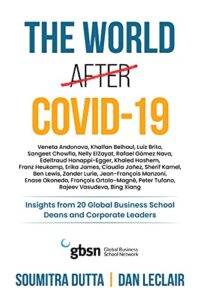We are witnessing a mixed picture on the Covid crisis today. Many developed nations are relaxing the restrictions put in place over the last year, while some emerging markets are still caught in the midst of the Covid crisis. While we see hope and light at the end of the pandemic tunnel, the contours of the world after Covid-19 remain to be decided.
Last year, Dan LeClair, CEO – Global Business School Network and I reached out to deans from schools in countries like Nigeria, England, Mexico, Egypt, China and the United States with an invitation to speak with us. We invited them to pause, look up and ahead; to see past the immediate emergency and to think about what the future might look like in a world after Covid-19. The deans were generous with their time and many agreed to introduce us to business leaders who were willing to have a similar conversation. Our discussions with these business school and private sector leaders have been compiled into a book that has just been published by GBSN and is available on Amazon (https://amzn.to/3yibNyV). Three important themes emerged from our discussions:
Human – and humane – leadership
We were struck by how vulnerable our interviewees were willing to be. Their answers to personal questions, such as how their own leadership might change and what shifts they’d already seen in their own lives, were deeply considered and freely shared. Some were pursuing new hobbies; others found solace in exercise and time in nature. Most were spending more time with their families than they had in years, reconnecting and learning about the people who matter most. But they had not lost sight of those beyond their immediate circles: there was a real sense of connection and compassion with not just employees, but their employees’ families and communities more broadly. Somehow, they held rapid change – that acceleration necessitated by Covid-19 – and small, personal moments together.
Globalization vs turning inward
Geo-politics was a crucial part of our conversations. Globalization and the shifting role of supply chains emerged as strong themes. Asia’s role as a growing power was repeatedly highlighted; some interviewees suggested that Europe could harness the crisis to re-establish itself as a force to be reckoned with, while others believed Europe was going to be left behind by the Asian giants. The US’s inward turn unsettled many.
Our thought leaders wanted to know whether the world would work together, or pull apart; they were struck by just how sharply and fast the existing lines between the “haves and the have nots” had leapt into focus. Just about a year on, it is sobering to see how much those fault lines have widened, and saddening to realize how much pulling apart has occurred; today we see wealthy nations are racing ahead with vaccination programs while their poorer counterparts are left floundering.
Innovating with tech
All the leaders we interviewed agreed that the pandemic had accelerated digital transformation. Suddenly, companies had to coordinate work in a physically dispersed environment. The Covid-induced change was profound in education, where technology has had less of impact than many experts predicted in previous years. A major topic in the interviews was the role of platforms, such as Zoom, in ensuring continuity of asynchronous teaching and learning when health restrictions made residential learning impossible. Schools were forced to shift quickly, almost overnight, to deliver instruction, facilitate peer-to-peer engagement, and offer project-based experiential learning, all in a virtual environment. Faculty had to learn new digital skills and schools had to develop new models and capabilities.
Building back better and together
As discussed in many of the interviews, Covid-19 has elevated the need for organizations to work together to achieve important objectives. Many businesses deployed students and faculty to address local challenges brought on by Covid. For example, from the beginning many business schools collected, compiled, and communicated about data and information to support policy and business decisions. Students and professors have also worked on projects to help local SMEs pivot online, and to restart the local economy.
The world after Covid is still under construction, but we hope insights from the interviews will encourage and enable us to “build back better together”. Regardless, we believe the true value of these interviews is that they capture the moment: the views during the crisis about the unknown future to come. Our memories are surprisingly short and soon it will be easy to forget how we felt and the future we envisioned during that stressful time. We also hope the interviews serve as inspiration and guidance to leaders everywhere, especially about managing in a crisis.



